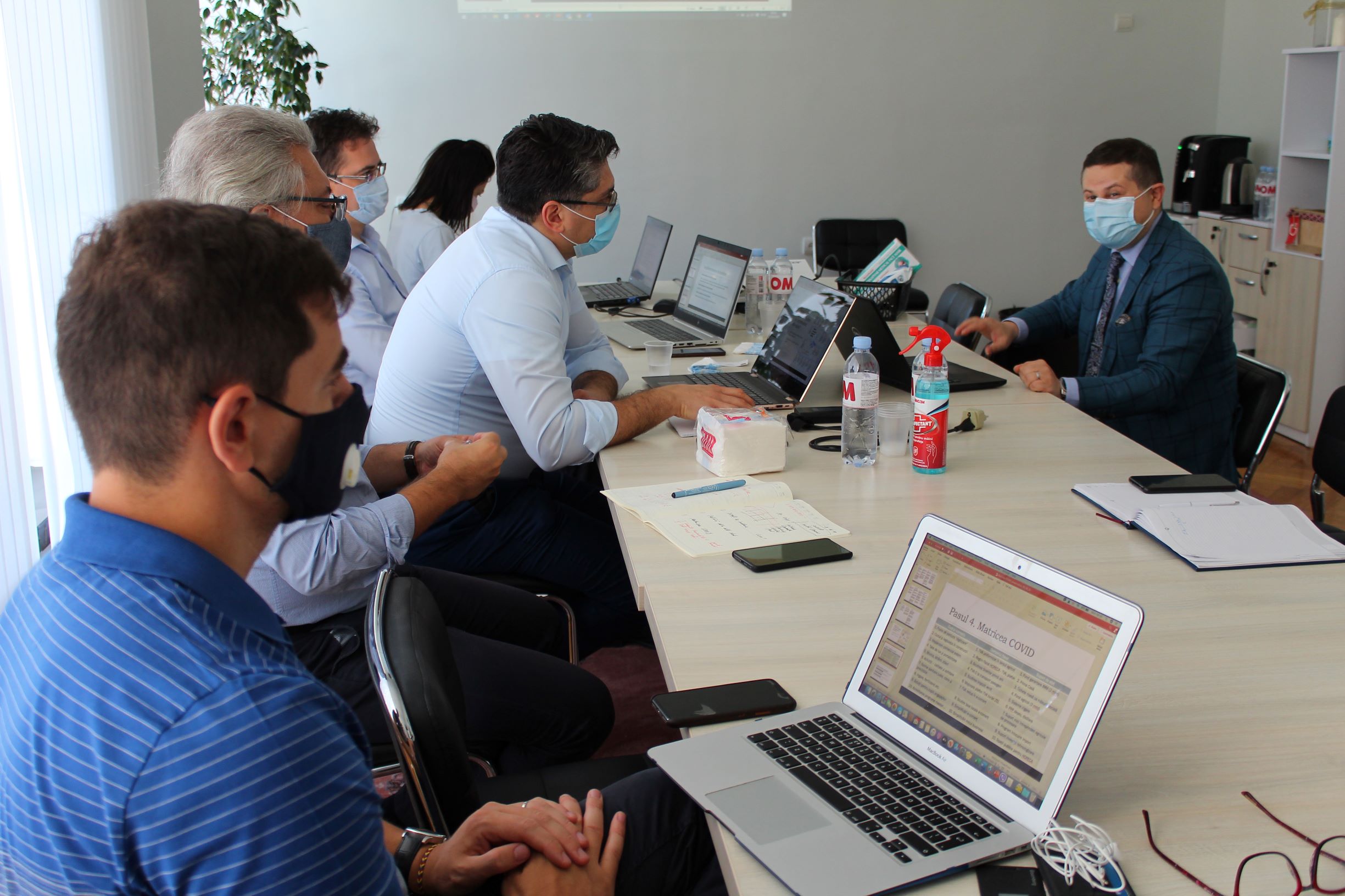The Secretariat of the Economic Council to the Prime Minister is supported by the European Bank for Reconstruction and Development, funded by the UK Government’s Good Governance Fund, and the International Finance Corporation’s Investment Climate Reform Project funded by the Government of Sweden’s International Development Agency.
ECONOMIC COUNCIL TO THE PRIME MINISTER OF THE RM

The transformation of the ICT sector from a semi-formal one to one that accounts for about 10% of GDP has been made possible by the smart policy of creating IT spaces. Creative industries (design, movie production, video game production) that for the moment face more difficulties, could have a similar trajectory. Even though the pandemic crisis has not affected the ICT sector to the same extent as other sectors, it has become of utmost importance when remote work, online trade, dependence on electronic communications are sine qua non factors for the new reality.
Information technologies
IT sector has not been ” immune ” to the effects of the pandemic. It has been offering services to other sectors which once the state of emergency was established, considered investment in process automation not a priority and stopped or terminated contracts with information technology companies. This massive impact was consumed during the month of March, and between April and June a new direction of activity was outlined, also determined by the existence of traffic restrictions. It is about the e-commerce that has taken on an unprecedented significance under the quarantine conditions.
Respectively, in the early period of the pandemic there was a structural reorientation of the demand for information technologies to which the companies in the field responded with appropriate supply. Therefore, e-commerce, which “overnight” has become an important tool in maintaining sales and offering new export opportunities, has revealed a number of problems that are specific not so much for the ICT sector, as for this type of tool.
However, there are gaps and artificial obstacles for the widespread application of e-commerce. The most important of them are: 1. how to apply the digital signature; 2. compliance with the requirements of the legislation on the protection of personal data; 3. high bank charges related to online payments; and 4. poor regulation of labor relations during remote work.
Electronic communications
A concern for representatives of the ICT sector is keeping the “luxury tax” on mobile services, contrary to the previously announced budgetary-fiscal policy proposing its cancellation. Similarly, the sector is disappointed by keeping the excessive contributions, such as the payment for the operation of the centralized database for ensuring portability, the compensatory remuneration for private copy and the introduction of the portability fee in the amount of 50% from the payment for operation. It goes without saying that these charges directly lead to higher mobile telephony costs for consumers, but as the pandemic places an increasing emphasis on e-commerce, remote work, online services, these costs will become an additional and unjustified burden on mobile telephony consumers. The drastic reduction, in the midst of the pandemic of the mobile termination rate and keeping at the same time an excessive fixed termination rate of the state-owned incumbent operator also raises concern. Added to this are the extremely complex and inefficient procedures for authorizing civil works for the construction of broadband networks, especially in the regions.
These, as well as other proposals from the ICT sector, can be found in the roadmap for the digitization of the economy launched during May by the Ministry of Economy and Infrastructure.
Creative industry
Creative industry brings together about 2500 micro, small and medium enterprises, providing jobs for about 12-15 thousand people, including about 3000 freelancers. The pandemic has unevenly affected companies in this sector. With the introduction of the state of emergency, marketing and promotion budgets were slashed, which negatively affected the volume of orders at large and medium-sized production houses. At the same time, online commerce caused a sudden demand for web design services, which benefited small entrepreneurs and freelancers. Due to the limitations of social distancing, the event industry has ceased to function.
A major challenge for the sector is the informal nature of employment. The costs of hiring as a natural person are prohibitive for the clients (56% of the costs are taxes), while obtaining the status of a legal entity is complicated. Tax legislation offers the possibility of carrying out individual economic activities (IEA), but the tax/statistical reporting requirements and the need for bookkeeping discourage freelancers from adopting the status of a legal entity. An optimal solution for them would be the regime of an authorized natural person (ANP) according to the model applied in Romania. Automated taxation subject to the volume of the transaction would allow these freelancers to be introduced into the formal economy and turn them into tax payers.
The solution described above is optimal for individual entrepreneurs. When it comes to medium-sized production houses, they want to benefit from special tax regimes similar to those offered to the ICT sector. Indeed, the economic potential to produce added value and generate exports is comparable. In essence, this would allow the use of local talent without requiring people to opt for emigration.
A specific problem for the film and advertising industry is the state’s policy on cash rebates (financial support). Such a policy applies in Romania, Ukraine and Georgia and consists in the reimbursement to the producer of a share (10-15%) of the cost of filming. In the Republic of Moldova, the policy has been accepted in principle by the adoption of the Law on foreign investments in the production of film and other audio-visual works, which provides financial support in the amount of 25% plus a 5% bonus if the film is promoting the image of the country. Unfortunately, that law was to be implemented through a government regulation, which has not yet been approved.
And not least, a coherent state policy that would promote local content is required. Annually, we import significant volumes of content (movies, music, books) from abroad and do very little to export. Currently, content producers survive thanks to donor support for social advertising, which limits creativity. To sell local content and especially to export it, one should offer national awards in neglected areas such as design, media, advertising, video games, etc. Another option is to organize and participate in thematic festivals, but his option cannot be implemented because of the pandemic.
* This information is collected during the discussions conducted by the experts who elaborate the Impact Study of the COVID-19 pandemic on the sectors of the economy. The data can be taken from the website www.consecon.gov.md only with the obligatory mention of the source “Economic Council under the Prime Minister of the Republic of Moldova” and the specification that “The impact study of the COVID-19 pandemic on the economic sectors is carried out by The Economic Council jointly with the Ministry of Economy and Infrastructure, with the support of the European Bank for Reconstruction and Development and the United Kingdom Government Fund for Good Governance. ”

The Secretariat of the Economic Council to the Prime Minister is supported by the European Bank for Reconstruction and Development, funded by the UK Government’s Good Governance Fund.










